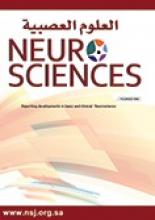Abstract
OBJECTIVE: To compare the efficacy of 2 atypical anti-psychotic drugs, olanzapine and risperidone, in the treatment of paradoxical insomnia.
METHODS: In this cross-sectional study over a 2-year period (September 2008 to September 2010), 29 patients with paradoxical insomnia, diagnosed in Kermanshah, Iran by both psychiatric interview and actigraphy, were randomly assigned to 2 groups. For 8 weeks, the first group (n=14) was treated with 10 mg olanzapine daily, and the second group (n=15) was treated with 4 mg risperidone daily. All participants completed the Pittsburgh Sleep Quality Inventory (PSQI) at baseline and at the end of the study.
RESULTS: As expected, a baseline actigraphy analysis showed that total sleep time was not significantly different between the 2 treatment groups (p<0.3). In both groups, sleep quality was improved (p<0.001) with treatment. When comparing the 2 treatments directions, a significant difference emerged (9.21+/-2.35, 6.07+/-4.46) among the 2 treatment groups based on data from the PSQI. Patients who were treated with olanzapine showed greater improvement than patients who were treated by risperidone (p<0.04).
CONCLUSION: Atypical anti-psychotic drugs such as olanzapine and risperidone may be beneficial options for treatment of paradoxical insomnia. Larger clinical trials with longer periods of follow-up are needed for further investigation.
- Copyright: © Neurosciences
Neurosciences is an Open Access journal and articles published are distributed under the terms of the Creative Commons Attribution-NonCommercial License (CC BY-NC). Readers may copy, distribute, and display the work for non-commercial purposes with the proper citation of the original work.






